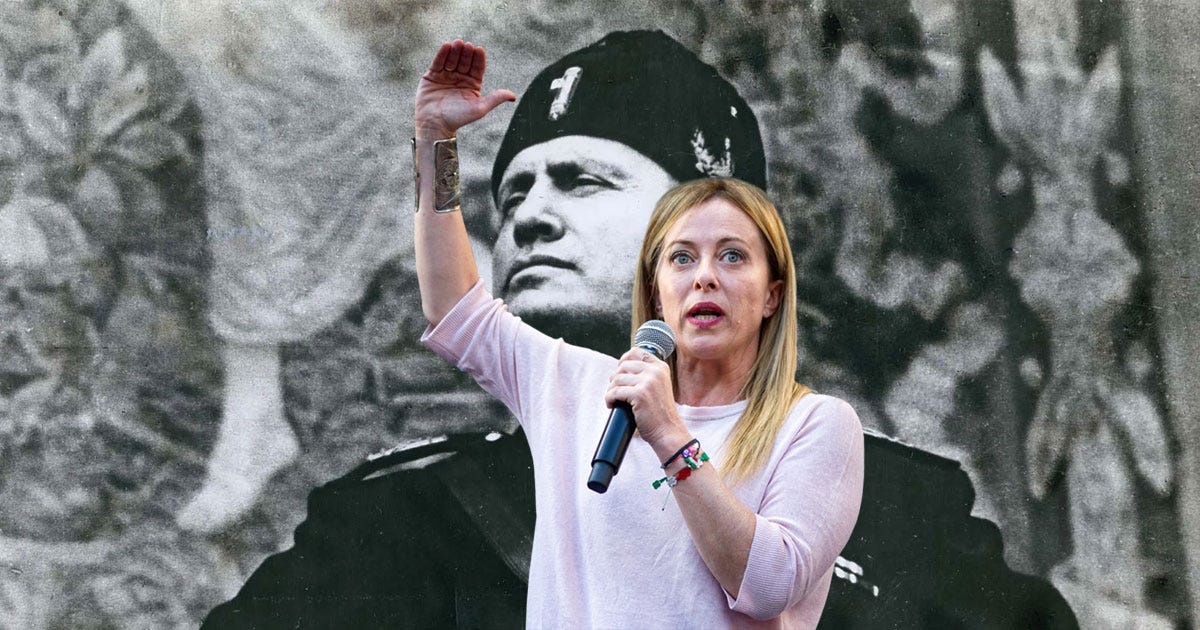The Weekly Weird #34
Meloni baloney, EU says 'non' to 'bleu' checks on X, crash dash for cash, Indian Railways gets in your face, UK national ID "inevitable", CJ Hopkins on trial (again)
Welcome back to your weekly roundup of the dystopian doings darkening the doorsteps of the denizens of the world!
In case you missed it, the new episode of the podcast is out now - I spoke with the best-selling author of dystopian fiction Christina Dalcher about her writing process and the way she structures her narratives for maximum impact. I hope you find a moment to check it out, it was good fun.
This week’s Irony Award goes to the US Secret Service, the agency tasked with protecting the president, and candidates for the presidency. After the attempted assassination of Donald Trump at an outdoor rally where the “sloped” roof from which the assassin took his shots was too risky for agents to stand on, and the resignation of the agency’s director days after she swore she was going nowhere, the federal agency has found a solution to the challenge of protecting Donald Trump during the remainder of his campaign: No more outdoor rallies.
Why not just campaign from his own basement like Biden did in 2020? That worked, after all. Why spend all this time and money protecting him outside when he could stay in, naked from the waist down like the rest of us are when we’re on video calls?
When are the video editors of the world going to perform the only coup worth doing and underscore the news with a laugh track?
Onwards!
Meloni Baloney
For the uninitiated, Giorgia Meloni is the Prime Minister of Italy (pictured below, proudly demonstrating that I’m referring to her).
Also for the uninitiated, ‘baloney’ is what some Americans call a cured meat product (pictured below - apparently derived from a mispronunciation of ‘Bologna’, a city in Italy famed for meat products), and a synonym for hooey, malarkey, nonsense, or, most commonly, bullshit.
As reported by Politico:
A Milan court has ruled that journalist Giulia Cortese must pay Italian Prime Minister Giorgia Meloni €5,000 for mocking her height on social media.
Yes, really. Here’s another photo of Meloni, this time showing how big a pair of balls it takes for a politician to sue a journalist for mockery.
The description of the “offence” continues:
The Italian freelance journalist was convicted for posting two “defamatory tweets” that “body shamed” the prime minister.
“You don’t scare me, Giorgia Meloni. After all, you’re only 1.2 meters (4 feet) tall. I can’t even see you,” Cortese wrote on X. In another post, she called the prime minister “a little woman.”
Accounts vary, but Meloni’s actual height is believed to be between 1.5 and 1.6 meters, making it rather unlikely that she genuinely believed people might think she was 4 feet tall. Instead of taking the razzing in her stride, she got litigious, hardly a classy move. There’s also a history to this beef, with Meloni previously accusing Cortese of a “despicable hoax” for sharing an edited image of her in front of a portrait of Il Duce himself, Benito Mussolini (the guy in the photo below, behind the angry midget showing how tall she wishes she was):
The Guardian reported on the case, and Cortese’s reaction to the verdict:
Cortese said that being convicted over a “joke phrase” was “scandalous”. “There’s [a] climate of persecution. I don’t feel I have the freedom any more to write about this government, because once you are identified as an inconvenient journalist for this government, they don’t let anything pass.”
Meloni has been accused in the past of misusing defamation lawsuits to stifle criticism, especially from journalists:
In a high-profile case last autumn, the anti-mafia writer Roberto Saviano was found guilty of libelling Meloni and fined €1,000 for calling her “a bastard” over her migration policies. The case dated back to a TV interview in December 2020 in which Saviano, author of the bestselling book Gomorrah, castigated Meloni and her fellow far-right leader Matteo Salvini on TV over their vitriol towards charity-run ships rescuing people in the Mediterranean.
How bad is it getting in Italy? Back to Politico:
Press associations have warned that government interference and lawsuits against journalists have grown since Meloni came to power in October 2022. This year, Italy dropped five slots — to 46th place — in Reporters Without Borders’ World Press Freedom Index.
To avoid doubt, and lawsuits, I don’t know how tall Meloni is, but “[a]ccording to various Italian news outlets, Meloni is 1.63 metres (5ft 3in) tall,” so I suppose she can only be called “a little woman” in spirit, because she sues people for teasing her.
EU Says ‘Non’ To ‘Bleu’ Checks On X
Thierry Breton, the Commissioner for the Internal Market of the EU, threw some shade at X and its owner Elon Musk this week, saying that the social media site’s ‘blue check’ system constituted a deceptive ‘dark pattern’ and broke EU law, specifically the new Digital Services Act (DSA).
The rulebook, also known as the DSA, is a sweeping set of regulations that requires platforms to take more responsibility for protecting their European users and cleaning up harmful or illegal content and products on their sites, under threat of hefty fines.
Regulators took aim at X’s blue checks, saying they constitute “dark patterns” that are not in line with industry best practice and can be used by malicious actors to deceive users.
‘Dark patterns’ is a recently-coined term for how a digital service’s process for users is set up to either force users into making selections against their best interests or mask problematic aspects of the service from users.
The blue checks in question used to be doled out only to people deemed suitably important by Twitter, but under Elon Musk’s leadership, anyone can get a blue check if they pay the subscription fee. While one might think that this still verifies them, since they have to give personal payment information to obtain the check, the EU says ‘non.’
“Since anyone can subscribe to obtain such a ‘verified” status’ it negatively affects users’ ability to make free and informed decisions about the authenticity of the accounts and the content they interact with,” the commission said.
A definition of “authenticity” does not appear to have been included. Could it be that the EU is ginning up a spat with X because they don’t like the fact that anyone who pays the fee can sound legit, instead of only a select few approved by anonymous internal employees in a hidden process?
Elon’s response to the accusation thickened the plot considerably:
“The European Commission offered X an illegal secret deal: if we quietly censored speech without telling anyone, they would not fine us. The other platforms accepted that deal. X did not.”
Thomas Fazi expanded on the background between Musk and the EU in his article for UnHerd:
In May 2023, [Musk] pulled out of the EU’s Code of Practice on Disinformation, which started out voluntary but was subsequently made de facto legally binding under the DSA. This triggered an investigation, in December, into whether the platform violated the DSA in areas such as “risk management, content moderation, dark patterns, advertising transparency and data access for researchers”. Last week it concluded that it did, hence the latest showdown.
X do censorship, though, let’s not forget that. For example, X strangles the reach and impact of anyone daring to use a certain platform called Substack. That’s why your humble correspondent has to use TinyURL to share links. They got caught throttling anti-government content on behalf of the Turkish government. In fact, as Fazi points out in his article, “a report from last year showed that under Musk, X had approved more than 80% of censorship requests from governments.”
All that said, it is still worth stepping back and seeing the situation in context. As Fazi argues:
Complying with these requests is often the only way that the company can continue to operate — and at least Musk, unlike the other major platform owners, has brought online censorship into the open. The publication of the groundbreaking Twitter Files, remember, revealed the shocking level of collusion between the US administration and social media companies.
More to the point, though, X, despite the censorship, remains the only platform where information is allowed to flow relatively freely. Indeed, it remains the single biggest threat to the establishment’s desire for full-spectrum information control — and that is why they are coming down on it so hard. But one man, no matter how rich or powerful, cannot be expected to single-handedly stand up to some of the most powerful governments in the world — let alone to the European Union, the world’s most influential supranational institution.
Another bugbear for the EU is the Community Notes feature, whereby regular users can correct, fact-check, or add context to a post. There’s even @HelpfulNotes, an X account that re-posts Community Notes that clarify important or popular misinformation. It seems unclear why that feature is a problem for information misinterpretation rather than a solution, especially since the preferred option for governments is a direct back-channel to demand the suppression of information they dislike.
Breton shared his official quote on the findings of the report, phrased not unlike a threat:
Back in the day, BlueChecks used to mean trustworthy sources of information. Now with X, our preliminary view is that they deceive users and infringe the DSA. We also consider that X’s ads repository and conditions for data access by researchers are not in line with the DSA transparency requirements. X has now the right of defence — but if our view is confirmed we will impose fines and require significant changes.
Translation: “That’s a nice social media platform you’ve got there, Elon. It would be a shame if something would happen to it.”
How big of a threat to X is this latest move by the EU?
From AP again:
X now has a chance to respond to the accusations and make changes to comply, which would be legally binding. If the commission isn’t satisfied, it can levy penalties worth up to 6% of the company’s annual global revenue and order it to fix the problem.
Fazi’s UnHerd article is a banger and well worth a read, so I’ll quote at length from it here to close this segment:
Elites conveniently justify their censorship in two ways: by constantly expanding the scope of “hate speech” to cover almost anything; and, more ominously, by rebranding critical opinions, especially on foreign policy and geopolitical matters, as “disinformation” or examples of foreign interference.
[...]
This deliberate blurring of the line between illegal and harmful speech, and between critical opinion and foreign propaganda, is central to the censorship regime, as it effectively allows EU elites to determine what hundreds of millions of Europeans can or cannot say and read online. It’s state-sanctioned censorship, plain and simple. And it should come as no surprise that the greatest threat to free speech today comes from the EU: the bloc’s entire institutional edifice, after all, is geared towards constraining democracy, by transferring power to unaccountable elites largely insulated from the demos. In turn, the top-down imposition of unpopular policies on the people of Europe inevitably engenders opposition, which then requires the suppression of free speech to counter the backlash. It’s a vicious feedback loop.
Crash Dash For Cash
Some media outlets are having a “frien’assaince” with cash after the Crowdstrike crash knocked out payment platforms and reminded people that the entire edifice of modern technological society sits exposed and unprotected under a veritable sledgehammer of Damocles in the form of every single person on the planet with a computer who at any point could screw something up that affects the whole system.
And that doesn’t even open the subject of a modern-day Carrington Event. But anyway…
Wired, for example, published an article this week called The Global CrowdStrike Outage Triggered a Surprise Return to Cash.
“Surprise”? To whom?
Wired point out that the crash “quickly caused chaos in Australia, whose government has explicitly encouraged businesses to go cashless.”
Pictures posted on social media showed card-only self-checkout registers at the grocery chain Coles displaying Blue Screens of Death (BSODs). Queues for human-run registers at Australian groceries stretched to the back of the store, according to local media. Some Australian marts simply locked their doors.
With a gratifying demonstration of partial memory, Wired mention the way the pushing out of cash from transactions accelerated during the pandemic:
In 2020, there was a surge of businesses going cashless in response to the pandemic, which disrupted the circulation of physical money.
“Disrupted the circulation of physical money”? Wasn’t it more about the later-debunked claims that cash could carry the virus and was therefore a threat to public health? It was the media and certain opportunistic actors who “disrupted the circulation” of cash, not the pandemic itself.
Exhibit A: This CNN article from March 7, 2020, titled Dirty money: The case against using cash during the coronavirus outbreak.
Nick Corbishley at Naked Capitalism has a good piece on the media’s about-face on cash in the wake of the Crowdstrike crash, and he samples some of the tastier headlines from the tabloid media (“DIGITAL PANDEMIC” is a typically measured headline).
Going cashless, especially too quickly and against the will of some of your population, can be counter-productive, as Sweden’s central bank (the Riksbank) found out. Subsequently, they had to mandate the provision of certain cash services to prevent people being totally left out of the economy.
Wired managed to find an expert who summed up the situation faced by the global economy in the internet age with fantastic understatement:
Richard Forno, a cybersecurity lecturer at the University of Maryland, tells WIRED that Friday’s outage demonstrates the vulnerability of our current cloud and internet infrastructure. “Software supply chains have long been a serious cybersecurity concern and potential single point of failure,” Forno says. “Given today’s events, with any luck, perhaps the world may finally realize that our modern information- and often cloud-based society is based on a very fragile foundation that’s not built for security or resiliency.”
Indian Railways Gets In Your Face
Biometric Update reported this week that “[f]acial recognition and AI monitoring [have been] deployed in India’s largest railway network.”
From the article (emphasis mine):
India’s rail networks are adding AI and facial recognition systems to their stations, part of a growing biometrics and surveillance market experts predict will be worth more than US$15 billion within the next five years.
A release from IDIS Global says the South Korean video surveillance manufacturer is providing Indian Railways, Asia’s largest rail network, with a 4K camera system equipped with integrated AI video analytics and facial recognition technology from Herta Security. The first phase of a major technology update for the rail system saw cameras placed across hundreds of platforms in 230 high-traffic stations across the country’s eastern region in May 2024.
Herta Security’s facial recognition algorithms provide real-time identification and alerts to persons-of-interest. IDIS’s configurable deep learning analytics system analyzes motion, loitering, abandoned object detection and line crossing. With a monitoring center installed at every fifth station along the network, railway authorities have a connected ecosystem of command and control hubs through which to monitor, analyze data and respond to crisis events.
Moreover, the system’s video management platform offers mobile surveillance through the IDIS Mobile Plus app, wherein image and video captured from smartphones can be fed into the system.
[…]
Indian Railways 14,000 trains carry an estimated 9.5 million passengers daily. The network expects to handle up 40 percent of global rail activity by 2050.
Remember that this is happening in a nation that already has the world’s largest biometric identification system (Aadhaar). It’s not a far-fetched point to make, that a government with biometric markers for almost all of their population, and a public transit system with real-time biometric tracking capability, has constructed a net from which few people would be able to escape.
Not a pretty picture of India’s future, or anyone else’s, for that matter.
UK National ID “Inevitable”
What a difference an election makes. Shortly after being elected in a landslide (by seats in Parliament) with a record-low number of actual votes, Britain’s new Labour government has hit the ground running with thirty-nine pieces of legislation they want to get passed.
One of them is the “Digital Information and Smart Data Bill”.
From Biometric Update (emphasis mine):
According to the bill, digital verification services will help people prove information about themselves and allow for smoother online transactions by helping with things like moving house, pre-employment checks, and buying age-restricted goods and services. They will also help lessen the burden on businesses by “reducing costs, time and data leakage.”
[…]
The Digital Information and Smart Data Bill (DISD) also plans to introduce reforms into data sharing and standards and give the Information Commissioner’s Office (ICO) stronger powers.
Other goals include offering better digital public services and setting up Smart Data schemes that can help share customers’ data with authorized third-party providers (ATPs). The document, however, lacks details on how the data will be stored, shared and exploited.
The bill also arrives amid debates among the new Labor government on introducing digital identity.
This all sits within a flurry of voices from Labour’s last round of civil liberties evisceration, namely Tony Blair and David Blunkett, the latter even going so far as to say that some form of digital ID in Britain is “inevitable”.
Come to think of it, I don’t know of that word ever being used to describe something good…
The British public seem to be hip to the vibe, with major concerns being that “digital identity services could become mandatory over time and that large companies that are not based in the UK may access their data.”
A couple of weeks ago, the new government were saying that they categorically rejected the idea of national ID cards, and here in the Weird I pointed out that they hadn’t been nearly as unequivocal on digital ID. Well, here we are.
CJ Hopkins On Trial (Again)
American satirist, author, and friend-of-the-show
will be back on trial in Berlin in August.In CJ’s words from Consent Factory:
The Berlin Superior Court has set a date for my next thoughtcrime trial. As regular readers will probably recall, my first thoughtcrime trial in January ended with my acquittal. So, the German authorities are putting me on trial again. Yes, they can do that in Germany. But, wait, that’s not the best part.
As an aside, as mentioned in my coverage of the trial back in January, the court was permitted seven days to file for an appeal against his acquittal, which they then chose to do for reasons clear to no-one, especially since the penalty they were seeking against him will surely be dwarfed by the cost of retrying the case.
More from CJ:
The best part is, at my new thoughtcrime trial — this time in Berlin Superior Court — full-scale Anti-Terrorism Security protocols will be effect in the courtroom. Everyone will be subjected to TSA-style scanning and screening, and will have to surrender all their personal possessions and hats and coats and head coverings to the Security Staff, and completely empty their pockets of all items, before entering the courtroom. No computers, phones, smart-watches, or any other potential recording devices will be allowed in the courtroom. Pencils and sheets of paper will purportedly be provided to members of the press by Security Staff. Members of the press and public will be limited to 35, and, after they have successfully passed their “security screening,” they will be cordoned off in the last five rows of the gallery in the very back of the courtroom, “for security reasons,” and monitored by the armed Security Staff.
I attended the first trial, and the authorities at the regional court were definitely nonplussed by the arrival of his unexpectedly large number of supporters. The trial ended up being moved to a larger courtroom, and the start was delayed under the watchful, brooding gaze of disapproving guards apparently not used to the accused having people with them who believed in their innocence and rectitude.
If you’re late to the party on this, CJ is being railroaded for tweeting an image of his own book cover, in the context of criticising mask mandates in Germany during the pandemic.
Here’s the cover artwork of that book. The other two images are the recent covers of Der Spiegel and Stern, two well-known mainstream German magazines, which are not being prosecuted for “spreading pro-Nazi propaganda.”
If you see more than a passing resemblance between the three images above, that’s because they are thematically identical - political commentary warning against a perceived rise of totalitarianism. However, only one of the people behind these three covers is being criminally prosecuted, and it ain’t the staffers at Der Spiegel or Stern.
So if he’s already been acquitted, why the repeat? CJ explains:
The way the German legal system works, if they want to do you, is (1) you are acquitted in the lower Criminal Court, (2) the District Prosecutor appeals the verdict to the Superior Court, (3) the Superior Court overturns your acquittal, and (4) the prosecution goes back to the original Criminal Court, which stages a new trial, at which you will be found guilty, because, once the Superior Court has overruled your acquittal, the Criminal Court will convict you based on the Superior Court’s ruling. At which point you will appeal. And on and on and on it will go, until you are broke, or until you give up fighting because you are just so fucking exhausted.
I can’t attend the trial in August but I will endeavour to have CJ on the podcast again to discuss this ‘second round of hostilities’, as the whole situation is as baffling as it is infuriating. Since he does it so well, I’ll leave it to CJ to finish up this segment:
We are heading somewhere very ugly … somewhere most of us can’t imagine. Some of us will get there first, but all of us will be there, together, eventually. My story is just one example of what it will be like there, in that ugly place. It isn’t really a story about Germany. It is a story about the end of the myth of democracy, and the rule of law, and all that good stuff. As Frank Zappa once so eloquently explained …
“The illusion of freedom will continue as long as it’s profitable to continue the illusion. At the point where the illusion becomes too expensive to maintain, they will just take down the scenery, they will pull back the curtains, they will move the tables and chairs out of the way and you will see the brick wall at the back of the theater.”
It’s something to behold, that brick wall is, especially up close and personal. You’ll see when you get here. I’ll save you a seat.
We don’t usually do calls to action here in the Weird, but if you fancy supporting CJ remotely, or in person, or in some other capacity, find him at cjhopkins.com or consentfactory.org, or on his Substack (
), and let him know he’s not fighting this alone. He could have cut a deal a long time ago, but chose not to do that simply to make the point that he wasn’t going to take this lying down. Regardless of whether or not you agree with him about this or any other subject, I’d say he deserves respect for his courage and steadfastness.We’re pulling for you, brother.
That’s it for this week’s Weird, everyone. Thanks as always for reading.
Outro music is Beef Bologna by the seminal punk band Fear, in honour of Giulia Cortese’s failed battle over the right to mock a politician, and in support of CJ Hopkins’ hopefully-soon-to-be-successful attempt to defend the right to say things in Germany.
Stay sane, friends.












Many thanks, Mike!
Clear and hold operations it seems.
Nice roundup I didn’t realise baloney was such a bitch